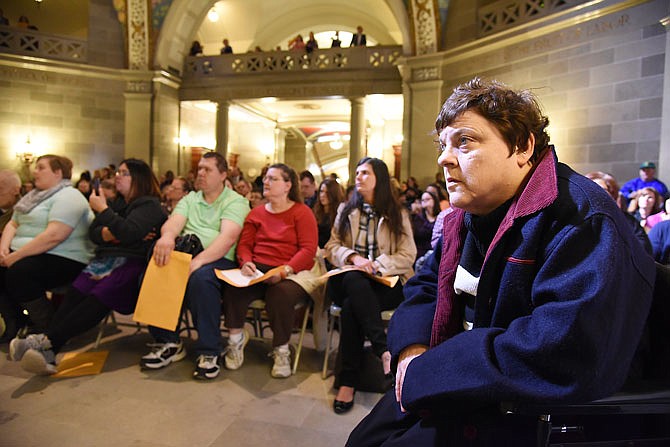Advocates for people with disabilities gathered in the state Capitol Rotunda on Wednesday to emphasize the need for Missouri lawmakers to support legislation that promotes inclusion.
Laura Mueth, a representative of the Governor's Council on Disability, said Disability Rights Legislative Day is the time for everyone to be educated about how legislation can impact their lives. This was the program's 16th year.
"We want legislators to know that people with disabilities choose inclusion in every aspect of community life," Mueth said. "When you're looking at the budget or any piece of legislation, keep us in mind. We want to be members of the community."
Various speakers talked to the crowd about legislation like the Medicaid block grant bill, guardianship laws and employment protection rights.
State Rep. Jim Neely, R-Cameron, told the crowd how unfair laws can limit the ability of a person with a disability to live freely.
Under current law, he explained, people with disabilities can have a maximum of $2,000 in their bank account if they are seeking eligibility under Medicaid. Neely suggested some people are unable to get married because they will exceed the required income threshold.
"When you see your legislators, make sure that they understand who they are hurting," Neely said.
Marci Stroebel and Shannon Blank, both of the Independent Living Center in Joplin, said all services available to people with intellectual and developmental disabilities are crucial.
"We're here on behalf of our consumers because we want to see people maintain their services in their homes so that they have the level of support to live independently," Stroebel said.
Blank said if it wasn't for Medicaid benefits, she would not have been able to return to work, as she received a prosthetic leg paid for through Medicaid benefits.
"I'm not on Medicaid anymore, but had it not been for that I would probably be at home on welfare," she said.
Blank pointed out the Medicaid block grant legislation is also on their watch list. The block grant would change the way the state receives federal funding for Medicaid users, capping the allocation of funds the state receives for those eligible for Medicaid. She explained a large portion of people wouldn't qualify for Medicaid if they raised the limit, therefore reducing the level of affordability for the consumers they provide services for.
"I just want our legislators to remember that these are real individuals that are just trying to live their daily lives independently, and their decisions impact them personally," Stroebel said.

